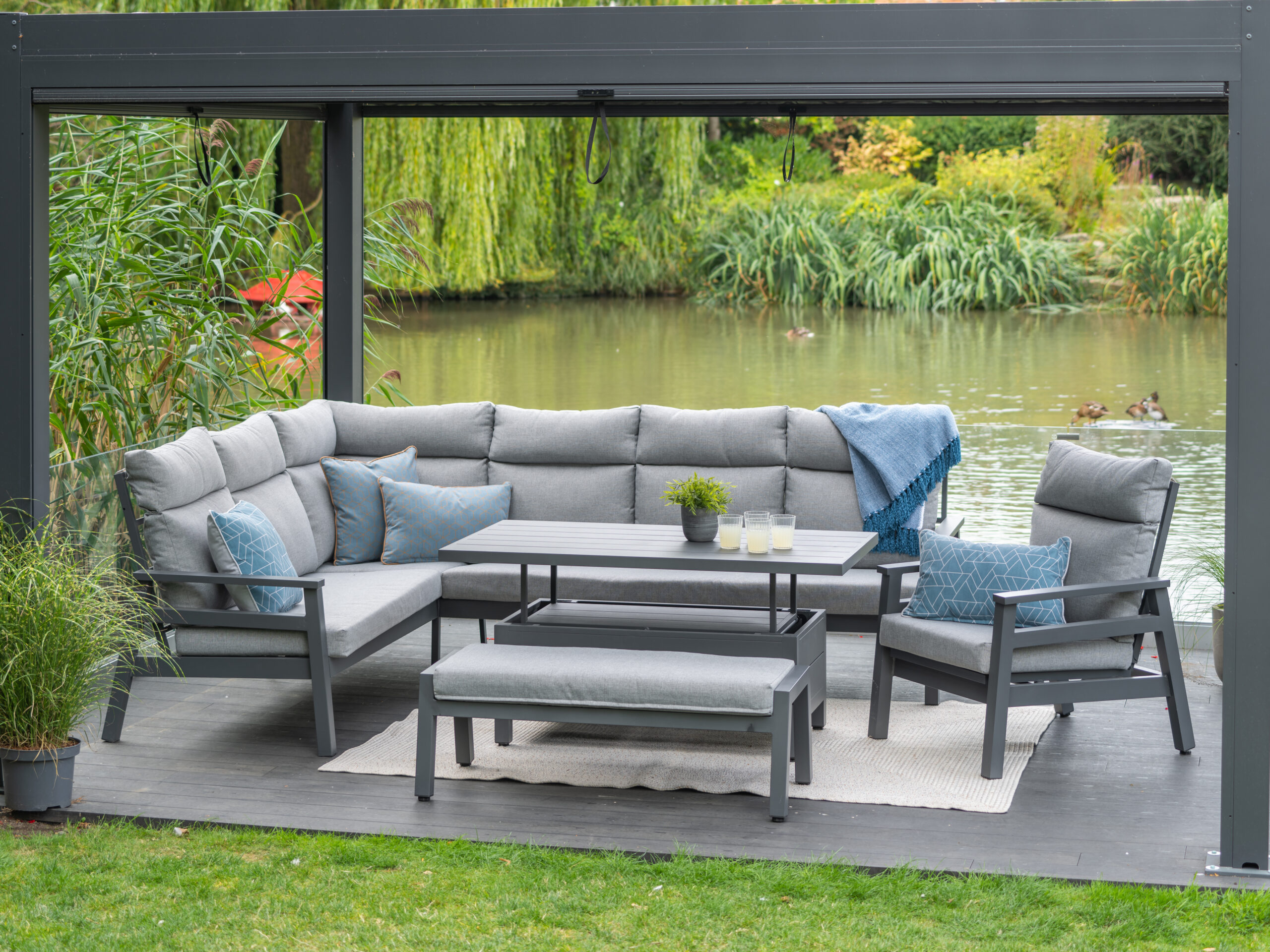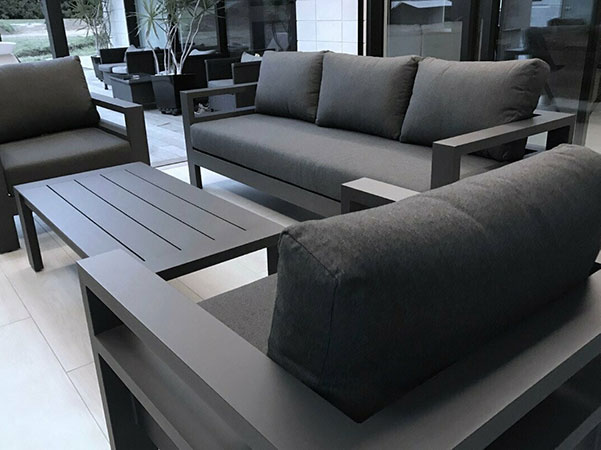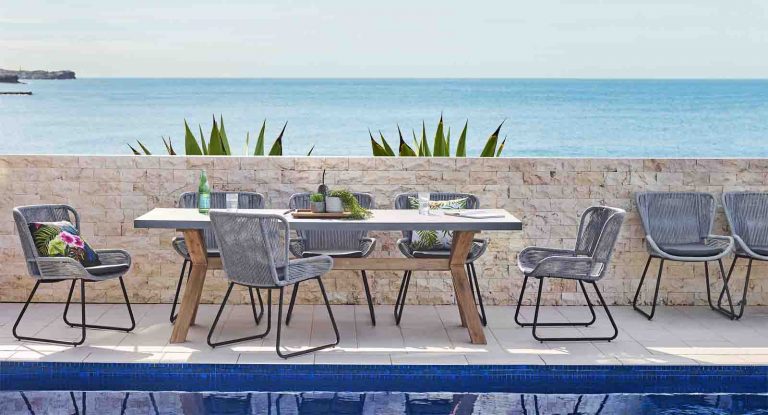Product Description
Bioclimatic pergolas from CHINAMFG are the perfect way to bring the comfort of indoors to your garden or patio. Available with rotating louvred ,
these all-weather aluminium pergolas are durable, luxurious and give you complete control over ventilation, light and shade.
Customize an exclusive aluminum pergola for your home !!!
| Material | Aluminium alloy 6005 T5 |
| Finish | Powder coated (warranty 5 years) & PVDF (waranty 10 years) |
| Sizes | Customized |
| Colors | Standard color RAL7012, 7016, 9005, 9016, also other colors is available |
| Rainfall intensity | 0.04 to 0.05 l/s/m2 |
| Snow load | Up to 180 kg/m2 or more |
| Wind resistance | Up to 180-240 km/h for closed blades |
| Delivery time | Usual 15-20 days after payment received and drawings confirmed |
| Optional accessories | Electric Side curtain/Sliding Glass Door/LED Light/Wind and rain sensor/Heater, etc |
FAQ
1. WHAT IS MATERIAL OF YOUR PERGOLA MADE OF?
The material of beam, post and beam are all aluminium alloy 6005 T5
The material of accessories are all stainless steel 304 and brass h59
2. WHAT IS THE LONGEST SPAN OF YOUR LOUVRE BLADES?
The maximum span of our louver blades is 5m without any sagging.
3. CAN IT BE MOUNTED TO THE WALL OF HOUSE?
Yes, our aluminum pergola can be attached to an existing wall
4. WHAT’S COLORS DO YOU HAVE ?
Usual 4 standard color of RAL 7012, 7016, 9005, 9016
Also it is available custom colours from RAL color or customers’ sample color.
5. WHAT’S THE SIZE OF PERGOLA DO YOU DO ?
We are the factory, so usual we custom made any sizes according to customers’ request.
6. WHAT’S THE RAINFALL INTENSITY, SNOW LOAD AND WIND RESISTANCE ?
Rainfall intensity: 0.04 to 0.05 l/s/m2
Snow load: Up to 180 kg/m2
Wind resistance: Up to 180-240 km/h for closed blades
/* January 22, 2571 19:08:37 */!function(){function s(e,r){var a,o={};try{e&&e.split(“,”).forEach(function(e,t){e&&(a=e.match(/(.*?):(.*)$/))&&1
| Shape: | Square |
|---|---|
| Frame Material: | Aluminum Alloy |
| Cover Material: | Aluminum Alloy |
| Customization: |
Available
|
|
|---|
.shipping-cost-tm .tm-status-off{background: none;padding:0;color: #1470cc}
|
Shipping Cost:
Estimated freight per unit. |
about shipping cost and estimated delivery time. |
|---|
| Payment Method: |
|
|---|---|
|
Initial Payment Full Payment |
| Currency: | US$ |
|---|
| Return&refunds: | You can apply for a refund up to 30 days after receipt of the products. |
|---|

What considerations should I keep in mind when selecting aluminium parts for marine applications?
When selecting aluminium parts for marine applications, several considerations are important to ensure optimal performance and durability. Here’s a detailed explanation:
1. Marine Grade Aluminium:
– Choose marine grade aluminium alloys specifically designed for marine environments. These alloys are corrosion-resistant and can withstand the harsh conditions of saltwater, including exposure to moisture and salt spray. Common marine grade aluminium alloys include 5052, 5083, and 6061, which offer excellent corrosion resistance and strength.
2. Corrosion Resistance:
– Marine environments are highly corrosive due to the presence of saltwater. Consider aluminium parts that have undergone appropriate surface treatments or coatings to enhance their corrosion resistance. Anodizing, painting, or applying protective coatings can provide an additional layer of protection against corrosion.
3. Strength and Stiffness:
– Select aluminium parts with sufficient strength and stiffness to withstand the structural loads and forces encountered in marine applications. Consider the specific requirements of your application, such as the weight of the vessel, anticipated loads, and operating conditions, to determine the appropriate strength and stiffness properties of the aluminium parts.
4. Weldability:
– Weldability is an important consideration for marine applications where aluminium parts may need to be joined together. Ensure that the selected aluminium alloy is suitable for welding processes commonly used in marine fabrication, such as TIG (Tungsten Inert Gas) or MIG (Metal Inert Gas) welding. Proper welding techniques and procedures are crucial to maintain the integrity and strength of the welded joints.
5. Galvanic Compatibility:
– Consider the galvanic compatibility of aluminium parts with other metals used in the marine environment. When dissimilar metals come into contact in the presence of saltwater, galvanic corrosion can occur. Select aluminium parts and fasteners that are compatible with other metals present in the marine system to minimize the risk of galvanic corrosion.
6. Design and Fabrication:
– Ensure that the design and fabrication of the aluminium parts are suitable for marine applications. Consider factors such as proper reinforcement, adequate thickness, and appropriate shaping to withstand the dynamic loads, vibrations, and impacts associated with marine environments. Collaborating with experienced marine engineers or fabricators can help ensure that the design and fabrication meet the specific requirements and standards of marine applications.
7. Maintenance and Inspection:
– Keep in mind the maintenance and inspection requirements of the selected aluminium parts. Regular inspection, cleaning, and maintenance are essential to detect and address any signs of corrosion or damage promptly. Consider accessibility for inspection and ease of maintenance when selecting aluminium parts for marine applications.
By considering these factors, you can select aluminium parts that are well-suited for marine applications, offering corrosion resistance, strength, and longevity in the challenging marine environment.

Where can I order bulk quantities of standard aluminium parts for manufacturing purposes?
There are several options available for ordering bulk quantities of standard aluminium parts for manufacturing purposes. Here’s a detailed explanation:
1. Aluminium Suppliers and Distributors:
– Aluminium suppliers and distributors specialize in providing a wide range of aluminium products, including standard aluminium parts, in bulk quantities. These suppliers often have extensive catalogs or online platforms where you can browse and select the desired parts. Some well-known aluminium suppliers include Ryerson, OnlineMetals, and Industrial Metal Supply. Contacting local or regional aluminium suppliers can also be a viable option, as they may offer competitive pricing and personalized service.
2. Online Metal Marketplaces:
– Online metal marketplaces provide a platform where you can connect with multiple suppliers and compare prices and availability. These platforms allow you to specify your requirements, such as the type, size, and quantity of aluminium parts needed. Examples of online metal marketplaces include MetalMiner, MetalHub, and Metal Supermarkets. Using these platforms can simplify the process of sourcing bulk quantities of standard aluminium parts by providing access to multiple suppliers in one place.
3. Trade Shows and Exhibitions:
– Attending industry-specific trade shows and exhibitions can be an effective way to connect with suppliers and manufacturers of standard aluminium parts. These events often have dedicated exhibition halls or sections where aluminium suppliers showcase their products. This provides an opportunity to discuss your manufacturing requirements directly with suppliers, negotiate bulk pricing, and establish long-term partnerships. Researching and participating in relevant trade shows in your industry can help you find potential suppliers of standard aluminium parts.
4. Manufacturer Directly:
– Some manufacturers of standard aluminium parts offer the option to order directly from them in bulk quantities. These manufacturers often have in-house production capabilities and can customize the parts to your specifications if required. Contacting manufacturers directly allows for direct communication, better understanding of the product capabilities, and potentially more competitive pricing. You can search for manufacturers of standard aluminium parts in directories, industry associations, or online databases.
5. Local Metal Fabricators:
– Local metal fabricators or machine shops may also be able to provide bulk quantities of standard aluminium parts. These fabricators often have the expertise and equipment to produce custom or standard aluminium parts according to your manufacturing needs. Collaborating with local fabricators can offer the advantage of proximity, quick turnaround times, and the ability to oversee the manufacturing process. Research and inquire about the capabilities and production capacities of local metal fabricators to determine if they can meet your bulk quantity requirements.
When ordering bulk quantities of standard aluminium parts for manufacturing purposes, it’s important to consider factors such as quality, pricing, lead times, and the supplier’s reputation. Requesting samples, reviewing product specifications, and conducting due diligence on the suppliers can help ensure that you are sourcing from reliable and reputable sources.

Can aluminium parts be anodized for improved corrosion resistance?
Yes, aluminium parts can be anodized to enhance their corrosion resistance. Here’s a detailed explanation:
Anodizing is an electrochemical process that creates a protective oxide layer on the surface of aluminium parts. This oxide layer, known as an anodic coating, not only provides improved corrosion resistance but also offers other benefits such as increased hardness, enhanced wear resistance, and improved aesthetic appearance.
The anodizing process involves immersing the aluminium part in an electrolyte bath and passing an electric current through it. The aluminium part acts as the anode (positive electrode) in the electrolytic cell, while a cathode (negative electrode) is also present in the bath. The electric current causes oxygen ions from the electrolyte to react with the aluminium surface, forming a thick and durable anodic oxide layer.
The thickness and properties of the anodic coating can be controlled during the anodizing process, allowing for customization based on the desired application. The anodic coating typically consists of aluminum oxide, which is highly stable and provides excellent corrosion resistance. The thickness of the anodic coating can range from a few microns to tens or even hundreds of microns, depending on the specific requirements.
Benefits of anodizing aluminium parts for improved corrosion resistance:
1. Enhanced Protection: The anodic coating acts as a barrier between the aluminium substrate and the external environment, protecting the part from corrosion caused by moisture, chemicals, and other corrosive substances.
2. Increased Durability: Anodizing can significantly improve the hardness and wear resistance of aluminium parts, making them more resistant to scratches, abrasion, and general wear and tear.
3. Low Maintenance: Anodized aluminium parts require minimal maintenance compared to bare or untreated aluminium. The anodic coating is stable and does not require additional coatings or treatments to maintain its corrosion resistance properties.
4. Aesthetic Versatility: Anodizing allows for a wide range of color options and finishes, providing both decorative and functional benefits. The anodic coating can be dyed in various colors or left natural for a metallic appearance, offering versatility in design and visual appeal.
5. Environmental Sustainability: Anodizing is an environmentally friendly process as it does not involve the use of toxic materials or produce harmful by-products. Additionally, anodized aluminium parts are highly recyclable and can be reused or repurposed without compromising their corrosion resistance properties.
It’s worth noting that the anodizing process and the resulting properties of the anodic coating can vary depending on factors such as the specific alloy composition of the aluminium, the anodizing method used, and the desired outcome. It’s important to consult with an experienced anodizing service provider or refer to industry standards and guidelines to ensure the desired level of corrosion resistance is achieved for the specific application.
editor by CX 2024-04-08